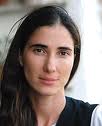
Cuba Libre Imprisoned in Havana

by Yoani Sánchez
Just yesterday, on the eve of the presentation in Chile of a compilation of my blog posts under the title Cuba Libre, I received a report from the Customs Department of the Republic. It confirmed the confiscation of ten copies of my book sent via DHL. In the rancid and brief words of the bureaucracy, it explained:
Physical inspection of the package found documents whose content goes against the general interests of the nation, and for this reason they have been seized consistent with the established legislation.I try to recreate the scene of “the specialists” clarifying if they would or would not permit the book to cross the borders of this Island and come into my hands. Would they look in its pages for some obscene images that could offend morality? Certainly they didn’t find any among the photos of inflammatory billboards with political slogans, the dilapidated bowels of an abandoned car and the Cuban flags on display in a market that does not accept national currency. The latter may seem obscene but it’s not my fault.
Would those who groped the phrases of Cuba Libre be zealous doctors of grammar, looking for an error, perhaps, or misuse of a verb tense? Were they military analysts, searching between the paragraphs of my chronicles for hidden codes, revelations about the economy, or secret State Security documents? They found none of that, not even the recipe for how to make guarapo, the nearly extinct national drink made by crushing sugar cane.
I make do with fantasizing that those who prevented the Spanish version of my posts reaching hundreds of friends, among whom they would have circulated, were some soldiers with more discipline than literacy. They were probably already warned by the listeners who constantly monitor my telephone; they might even have been warned not to read the contents. If three years of publishing in cyberspace would serve to bring my voice only to these grim censors, I would have sufficient reason to be satisfied. Something of me would remain inside them, just as their repressive presence has marked my chronicles, my book has pushed them to leap toward freedom.
Yoani Sánchez, born in Havana, 1975.
“I studied for two terms at the Pedagogical Institute, majoring in Spanish Literature. In 1995, I moved to the Faculty of Arts of Letters, and after five years finished a degree in Hispanic Philology. I majored in contemporary Latin American Literature, presenting an incendiary thesis entitled, “Words Under Pressure: A Study of the Literature of the Dictatorship in Latin America.” On finishing at the University I realized two things: first, the the world of the intellectual and high culture is repugnant to me and, most painfully, that I no longer wanted to be a philologist.
“In September 2000, I went to work in a dark office at Gente Nueva publisher, meanwhile arriving at the conviction—shared by most Cubans—that with the wages I earned legally I could not support my family. So, without concluding my social service, I asked to be let go and dedicated myself to the better-paid labor of freelance Spanish teacher for German tourists visiting Havana. It was a time (which continues today) when engineers preferred to drive a taxi, teachers would do almost anything to get a job at the desk of a hotel, and at store counters you could find a neurosurgeon or nuclear physicist. In 2002, disenchantment and economic suffocation led me to emigrate to Switzerland, from where I returned—for family reasons and against the advice of friends and acquaintances—in the summer of 2004.
“In those years I discovered the profession I continue to practice today: computer science. I discovered that binary code is more transparent than affected intellectualism, and that if I’d never really come to terms with Latin, at least I could work with the long chains of HTML language. In 2004 I founded, with a group of Cubans all based on the Island, Consenso, a magazine of reflection and debate. Three years later I work as a web master, columnist, and editor of the site Desde Cuba [From Cuba].
“In April 2007, I entangled myself in the adventure of having a blog called Generation Y that I have defined as “an exercise in cowardice” which lets me say, in this space, what is forbidden to me in my civic action.
“To my surprise, this personal therapy earned me, in a short time, the attention of thousands of people around the world. Thanks to the virtual citizens’ network that has woven itself around GY, I have been able to update this blog every week. Since March 2008, the Cuban government has enforced a computer filter that prevents seeing my blog from public Internet sites in Cuba. So I need the solidarity of friends off the Island to post my texts on the web. Thanks also to other volunteer collaborators, Generation Y is translated into fifteen languages.
In May 2008, my personal exorcism also won me the Ortega y Gasset Journalism Award in the digital category. I was chosen by Time Magazine as one of the 100 Most Influential People in the World in the “Heroes and Pioneers” category, and my blog was included on the list of the 25 Best Blogs in the World issued by Time Magazine/CNN. I won the Jury Prize on the Spanish blog contest, Bitacoras.com, and top honors in the well known blog contest, The BOBs Awards, with more than 12,000 participants from around the world. The weekly magazine of the Spanish newspaper El Pais named the 100 Most Notable Hispanic Americans of 2008 in November of that year; Foreign Policy listed its 10 Most Influential IberoAmerican Intellectuals of 2008 in December; as did the Mexican magazine Gate Pardo. Your humble servant is included in each of these lists. Much more than I could have dreamed of, when I started to combine sentences to upload my first post!”
See her blog at: www.desdecuba.com/generationy